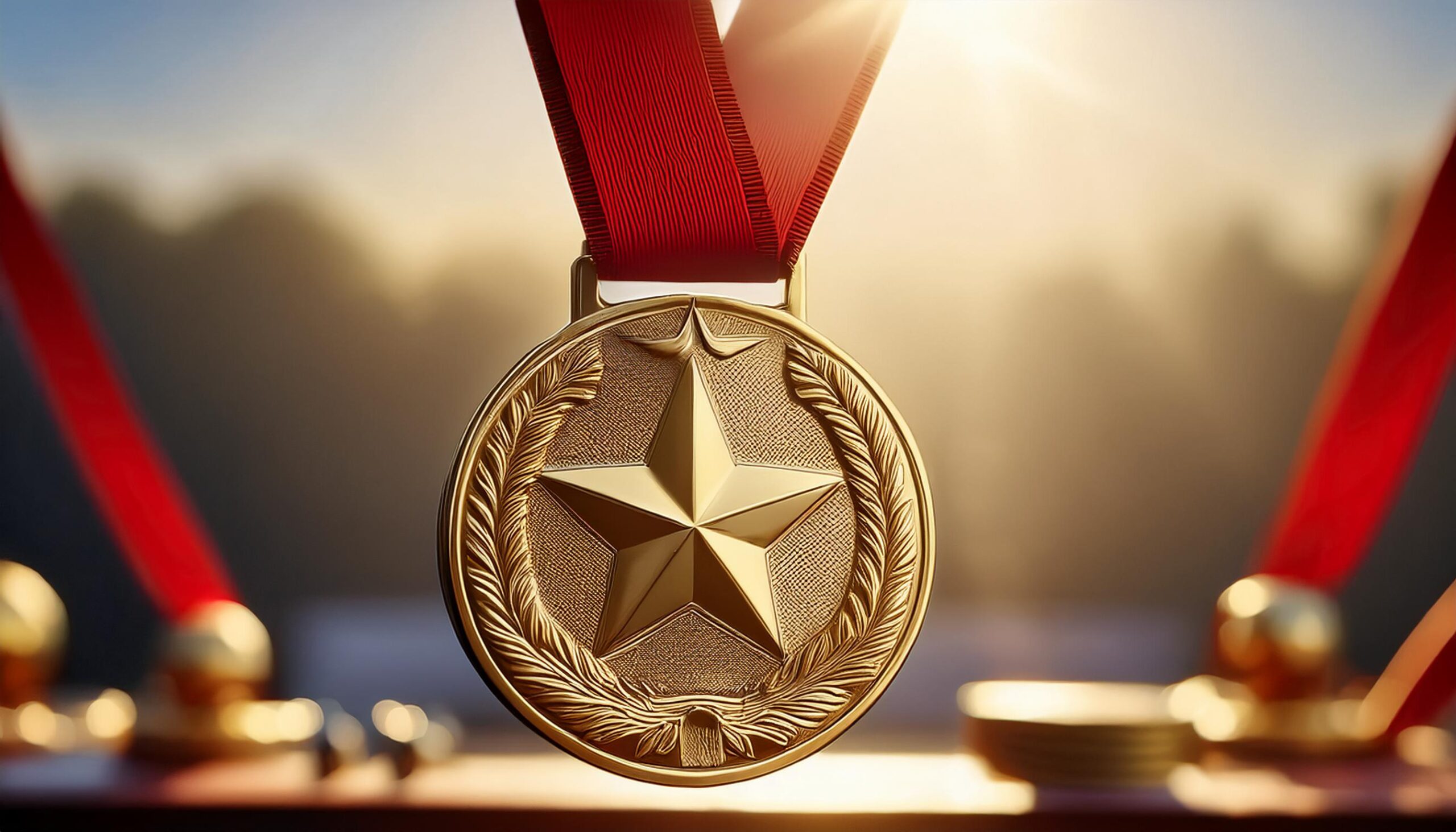Source: Firefly_AI Generated-A close-up of a shiny gold medal with intricate details, hanging from a vibrant red ribbon.
The vibrant shine and luster of Gold makes it a high value metal suitable for making coins, jewellery, vessels, and even, medals. Their rarity and symbolism have increased their appeal amongst civilisations for generations and wars have been fought just to attain the slightest bit of this metal.
Today, there’s an easier method than war available for getting a gold but it still requires people to do hard work on their part. Gold medals are awarded to prestigious acts and to winners of certain competitions for their performances. These are given because of the cultural value and symbolism of gold as a pure and valuable metal, and carry lots of prestige and honor, marking the winner’s place in history as the best.
The importance of gold
The reasons behind gold being awarded to the best in any field can be traced back to history where we can delve into its cultural roots to understand how it came to represent the pinnacle of success.
Its rarity is part of the appeal; copper is found at 55 parts per million in the earth’s crust but gold is only present at 0.0038 parts per million. This gives it a very high social value in modern as well as the archaic society before us. The earliest known artifacts made of gold were found in present-day Bulgaria and date back to the 5th millennium B.C., and its significance hasn’t died ever since then. It was soon used to make coins which were made into a commodity. This exact process can be dated back to the 7th century B.C. But although it has been precious in all periods of time, it reached the peak of popularity after the class society emerged. It was so because Gold had become a marker of social class and only the rich and wealthy had access to it.
The output also increased when brilliant discoveries were made in the mid-19th century in the US and Australia. But somehow the circulation of gold coins had completely stopped by the end of 1949. Paper money had come to replace it. But even then, gold wasn’t forgotten and soon, a gold standard was set and gold was democratized. So, we see that gold might have stopped being circulating but still holds immense value where it counts.
Why is a gold awarded?
In the Ancient Olympic Games, an olive branch was awarded to the winner as the gold medal wasn’t introduced yet. As we got to the more Modern Games, this soon switched to the traditional gold, silver and bronze medals. To understand why these metals were chosen as the standard, we have to study a bit of astronomy, geology, and chemistry.
When our galaxy was formed millions of years ago, the elements we have today formed our planets and everything else. The lighter and most common elements out of all these were placed on top in the periodic table, and heavier and rarer ones were placed towards the bottom. Gold, silver, and bronze were all placed in the same column and have more or less the same characteristics. Bronze is the one which is above the other three. Silver is one level down and Gold is one step below silver which makes it the rarest out of the three elements. This is how the three got chosen out of the many elements we have today- because of their rarity.
The value of this gold
The value of gold isn’t just limited to its prestige and rarity but also depends on the context in which it is used. For example, the importance of a gold medal in the Games cannot be downplayed. A country which has secured only one gold medal will still place much higher on the ranking table than a country which only has bronze and silver medals.
The value of this medal is determined by the International Olympics Committee (IOC) which assigns points to these medals and also decides which ranking system to use. There are a few weighted systems which are used by the IOC:
- Total medals- The ranking is based on the total number of medals and each medal is assigned the same value.
- Gold first method- The ranking first focuses on the gold medals secured by the teams, then at the silver and then, bronze.
- Total Gold medals- This ranking counts the total gold medals won, including the individual medals as well.
- Improvement rating- The main focus is the improvement percentage of the previous Games’ results.
You will notice that two out of these systems give the most importance to the gold medal, highlighting the weight of this medal yet again.
Replacing this
Talking about the importance of gold medals for so long will only amplify the curiosity you will feel once I tell you that there are some places where gold isn’t awarded to the best.
Let’s begin from the very beginning. Before the traditional gold, silver, and bronze were gifted, the Olympics have the winners Oliver wreathes. This was until 1896 after which the first-place winner was given a silver, the second-place winner received a copper, and the third-place winner got a bronze medal. Sometime later, in the 1900 Olympics, the winners received trophies because countries could decide what to give to the winners. The traditional awarding began in 1904 in the Olympics after these one.
This was in the past. What of the present, you ask? The US medal of honor and the Platinum Jubilee medal are both examples of different metals being gifted for stellar performance in their respective fields. The former gifts a silver while the latter includes a platinum medal as a reward for the winners.
Other than these two, there are quite a few military, literature, and cultural event awards which don’t use the gold medal. But if some events use another metal, it doesn’t mean gold is out of date. Undoubtedly, Gold still takes the cake.
Resources
- Schoenberger, E. (2011). Why is gold valuable? Nature, social power and the value of things. Cultural Geographies, 18(1), 3–24. http://www.jstor.org/stable/44251387
- More. (2017, January 10). ScienceABC. ScienceABC; ScienceABC. https://www.scienceabc.com/sports/where-did-the-idea-for-gold-silver-and-bronze-medals-come-from.html
- Szydlowski, M. (2018, February 20). Why are medals gold, silver and bronze? Columbia Daily Tribune; Columbia Daily Tribune. https://www.columbiatribune.com/story/lifestyle/family/2018/02/20/why-are-medals-gold-silver/987129007/
- Medal Tally Ranking Systems. (2016). Topendsports.com. https://www.topendsports.com/events/summer/medal-tally/rankings.htm#google_vignette
- Clinton, J. (2022, January 18). What is the Platinum Jubilee medal? Eligibility for the Queen’s medal explained. Inews.co.uk. https://inews.co.uk/news/platinum-jubilee-medal-what-queen-eligibility-explained-awarded-1407635
- About the Medal of Honor | Congressional Medal of Honor Society. (2024). Congressional Medal of Honor Society. https://www.cmohs.org/medal















